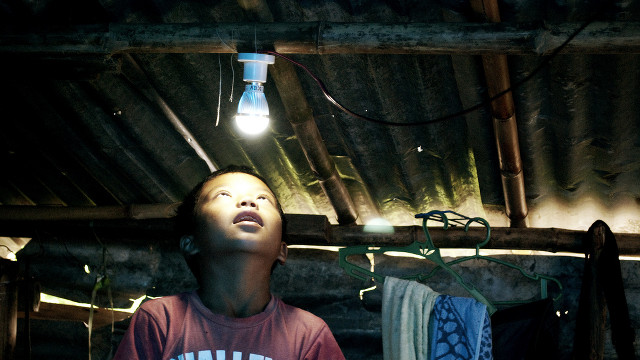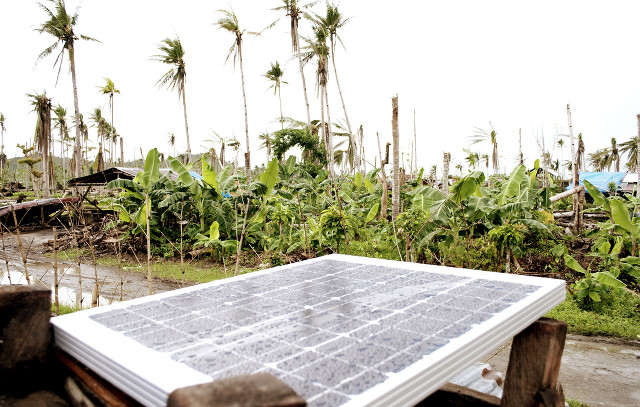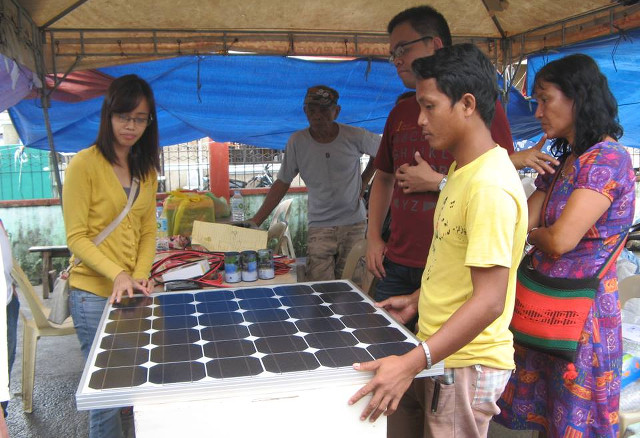SUMMARY
This is AI generated summarization, which may have errors. For context, always refer to the full article.

MANILA, Philippines – After Typhoon Yolanda (Haiyan) destroyed their house in Barangay Cabalagnan in Tanauan, Leyte, the Ibero family had to take extra pains just to power the temporary cottage they now call home.
They spent P20 for the 0.25 liters of kerosene needed to light their house every night.
Every two days, they shelled out P80 to have their mobile phone and flashlight charged. And that was after taking a 15-minute walk, including a rivercross, to the charging station.
For their basic energy needs, the Ibero family spent P280 a week, says Nim Gonzales, who wrote about the family’s experience in a blog.
The amount was almost 30% of their weekly income of P1,000 from processing copra (dried coconut meat kernel). What was left was used to buy food and other necessities for the family of 9.
There were many other families in similar situation, with their homes still unpowered after Yolanda devastated Visayas on November 8.
Though Energy Secretary Jericho Petilla said “100%” of the affected towns and municipalities have been reconnected to the electricity grid, many households lack the electrical system to accept power. (READ: More than half of Tacloban still without power)
A number of families in Cabalagnan got some relief, however, when a renewable energy group installed a 50-watt solar panel in the Iberos’ cottage last December 29.
Project EnKindle, the name of the group, has so far installed 7 solar emergency power systems in badly-hit Leyte for free. The systems were installed in homes in Tolosa, Tanauan, Villaba, Alangalang, and Tacloban.
One system is composed of a 50-watt solar panel, charge controller, battery, wiring, lights and cellular phone charging station, according to project head Michael Abundo.
Lighting up hope
The solar panel in the Ibero’s home powers their lightbulbs just as well as kerosene. The main difference? They don’t have to spend for it.
Project EnKindle is lending the solar panel for free. Sunlight, the raw material used by the panel to generate electricity, is an unlimited and free resource.
“The systems are lent to the communities and not donated because when the community does get grid power, then EnKindle will move the system to another community [which] does not yet have electricity,” Abundo told Rappler.

The solar panels made an immediate impact on the lives of people in the communities, said Abundo.
“The locals are very thankful. Most people are grateful for the light and the communications that they now have access to again. Some community were able to process requests for relief faster because of the electricity generated from the system. They were able to use their computers,” he said.
Aside from powering the homes they are installed in, the solar panel systems serve as a communal electronic charging station for the entire community. This means the neighbors of the Iberos don’t need to walk as far or pay just to charge their cellphones.
Green groups and energy advocates have called renewable energy the most sustainable energy source for the Philippines.
The country currently relies on a centralized grid system, which when damaged by typhoons, can lead to massive power outages. Decentralized RE systems would make island communities independent from the main grid and take advantage of the resources abundant there. (READ: Groups to Lacson: Tap renewable energy for Yolanda areas)
The big switch
The group aims to install a total of 30 solar systems in affected communities.
Providing mobile and easy to deploy energy sources like the solar panels they are now installing is only the first phase of the program.
After addressing immediate needs for power, they want to introduce renewable energy as a long-term solution for the typhoon-stricken communities.
For the second phase, they plan to replace the diesel generator sets used by the communities for emergency power with renewable energy systems.
This system, called a Class 2 system, is a “more permanent version” of the mobile, stand-alone solar panel systems in the first phase, said Abundo.

“Most probably, we will give these to schools. They will take ownership of the system and the community can use it for emergency power too during disasters if the school becomes an evacuation center. Additionally, the schools can use the system for their own power use.”
The 3rd phase will involve a more long-term shift from fossil fuel to renewable energy.
EnKindle will help the community form a micro-grid that will give them more independence from larger grids. Such an enterprise can also generate jobs and revenue for the community.
Obstacles
But major obstacles threaten the success of the project.
“There aren’t enough systems and manpower. Too many communities are in need,” said Abundo.
The group relies purely on donations from individuals and other organizations to buy the emergency solar power systems.
For the Class 2 and 3 systems, they plan to work with investors willing to support business models to install micro-grids in the communities. They will also collaborate with local groups and the communities themselves.
A Class 3 system that can power 100 households costs P1 million with operational and maintenance costs at P50,000 a year. For this to be sustainable, communities can form a cooperative.
Project EnKindle is looking for more volunteers to install more solar panel systems in other parts of Leyte, Samar and Cebu. They also want to partner with private companies who can sponsor their initiatives.
It’s going to be tough reaching all the households struggling to keep the lights on but Abundo is happy about the hope Project EnKindle has sparked.
“We recognize that we are just one small part of the equation toward normalcy, but I believe we are delivering good impact for the communities.” – Rappler.com
Do you want to volunteer or donate for Project EnKindle? Check out their Facebook page and website.
Add a comment
How does this make you feel?
There are no comments yet. Add your comment to start the conversation.